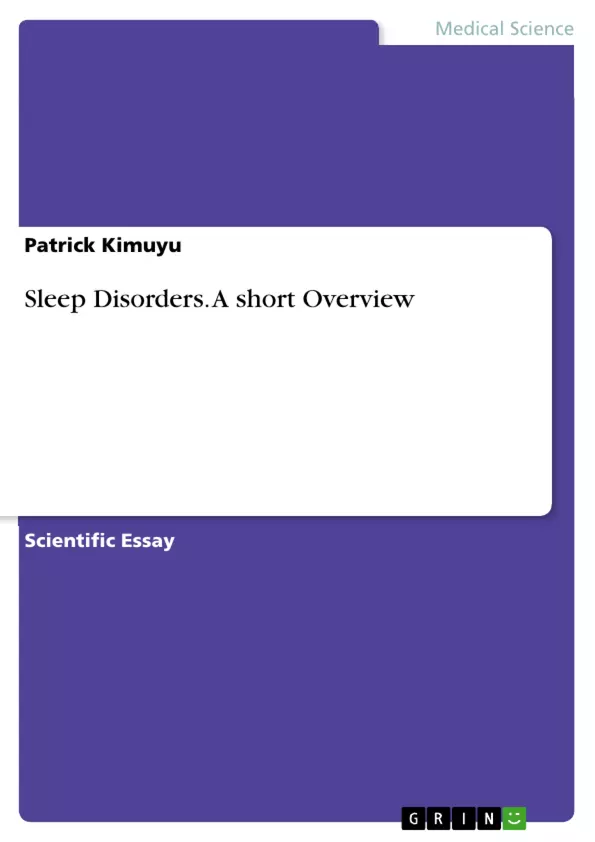Sleep plays significant health and physical roles in the body because it is linked to the humoral responses. As such, the quality of sleep acts as an indicator of one’s optimal health and physical well-being. However, the quality of sleep is usually interfered with by sleep disorders. Sleep disorders interrupt sleep by causing sleep disturbances. The most common sleep disorders are insomnia, sleep apnea, narcolepsy, restless leg syndrome and circadian rhythm problems.
Due to the biological mechanisms involved in sleep disorders, this paper will discuss sleep disorders and explain the role of hormones in sleep deprivation.
Inhaltsverzeichnis (Table of Contents)
- Introduction
- Common Sleep Disorders
- Insomnia
- Sleep Apnea
- Narcolepsy
- Restless Legs Syndrome
- Circadian Rhythms-associated Disorders
- Endocrine System and Sleep Disorders
- Thyroid Hormone
- Cortisol
- Melatonin
- Treatment of Sleep Disorders
- Conclusion
Zielsetzung und Themenschwerpunkte (Objectives and Key Themes)
This paper aims to provide a comprehensive overview of sleep disorders and explain the role of hormones in sleep deprivation. It focuses on the biological mechanisms involved in sleep disorders and explores the impact of hormonal imbalances on sleep patterns.
- Common types of sleep disorders: insomnia, sleep apnea, narcolepsy, restless legs syndrome, and circadian rhythm disorders.
- The influence of the endocrine system on sleep disorders, particularly the roles of thyroid hormone, cortisol, and melatonin.
- The impact of sleep deprivation on various aspects of health and well-being.
- The biological mechanisms underlying sleep disorders and their relationship to hormonal imbalances.
Zusammenfassung der Kapitel (Chapter Summaries)
The introduction discusses the importance of sleep for physical and mental well-being and explores the consequences of sleep deprivation. It highlights sleep as a biological indicator of health and introduces the concept of sleep disorders as disruptions in sleep patterns.
The chapter on Common Sleep Disorders presents a detailed overview of five prevalent sleep disorders: insomnia, sleep apnea, narcolepsy, restless legs syndrome, and circadian rhythm disorders. Each disorder is described in terms of its characteristics, symptoms, causes, and potential consequences.
The chapter on Endocrine System and Sleep Disorders explores the role of hormones in sleep deprivation. It delves into the specific functions of thyroid hormone, cortisol, and melatonin in regulating sleep and the impact of hormonal imbalances on sleep patterns.
Schlüsselwörter (Keywords)
The primary keywords and focus topics of this paper include sleep disorders, insomnia, sleep apnea, narcolepsy, restless legs syndrome, circadian rhythm disorders, endocrine system, hormones, thyroid hormone, cortisol, melatonin, sleep deprivation, and biological mechanisms.
Frequently Asked Questions
What are the most common types of sleep disorders?
The most prevalent sleep disorders include insomnia (difficulty falling asleep), sleep apnea (breathing interruptions), narcolepsy (excessive daytime sleepiness), restless legs syndrome, and circadian rhythm disorders.
How does the endocrine system affect sleep?
Hormones play a crucial role in regulating sleep patterns. Melatonin helps signal the body to sleep, cortisol is linked to stress and wakefulness, and thyroid hormones influence overall metabolism and energy levels, all of which impact sleep quality.
What is sleep apnea?
Sleep apnea is a serious disorder where breathing repeatedly starts and stops during sleep. It can lead to poor sleep quality and various health issues due to oxygen deprivation.
Why is sleep quality considered a biological indicator of health?
Good sleep is linked to humoral responses and physical well-being. Disturbances in sleep often reflect underlying hormonal imbalances or medical conditions, making sleep a key metric for overall health.
What are the consequences of sleep deprivation?
Chronic sleep deprivation can lead to impaired cognitive function, weakened immune system, hormonal imbalances, and increased risk of cardiovascular diseases and mental health issues.
- Arbeit zitieren
- Patrick Kimuyu (Autor:in), 2017, Sleep Disorders. A short Overview, München, GRIN Verlag, https://www.hausarbeiten.de/document/383553


